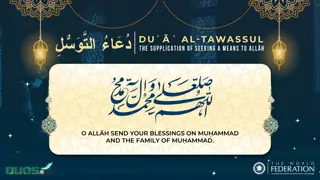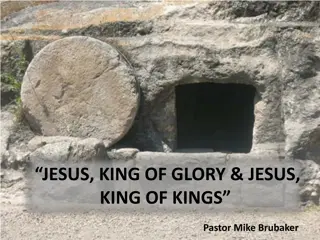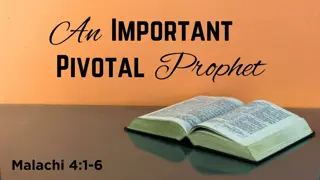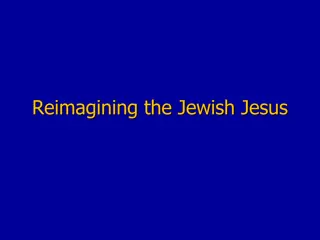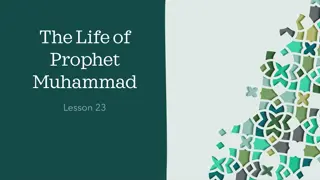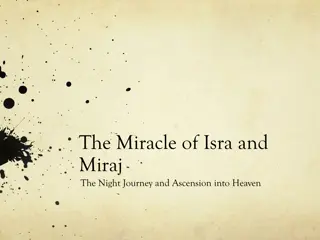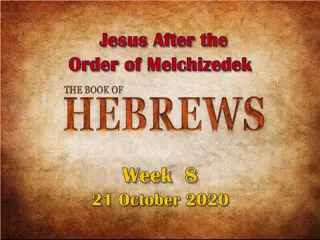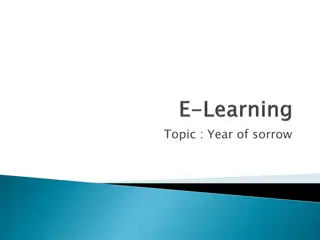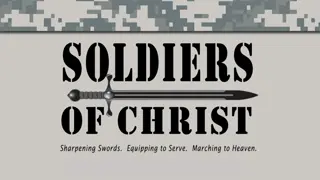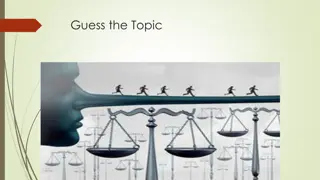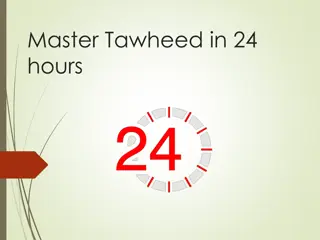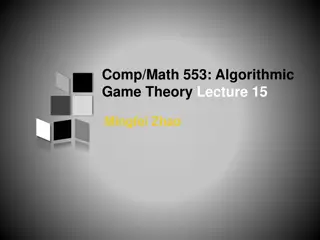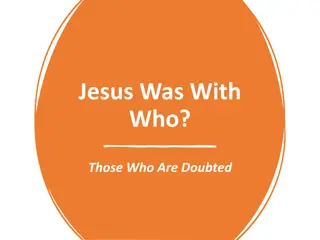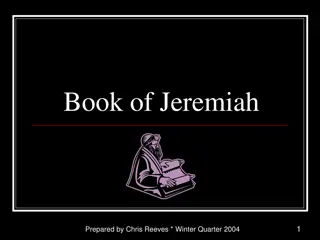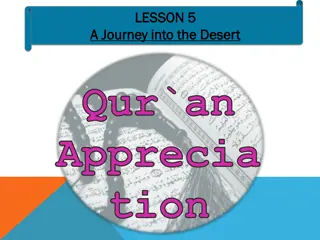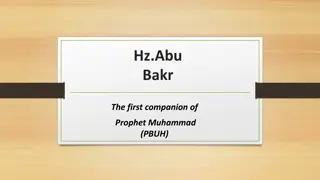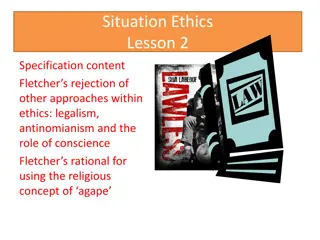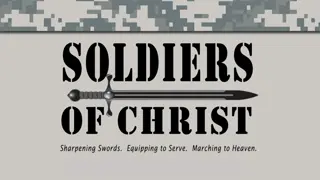The Offices of Jesus: Priest, Prophet, King
Delve into the profound roles of Jesus as Priest, Prophet, and King, exploring how believers are incorporated into Christ through baptism, embodying these shared offices in their own priestly calling. Learn about the significance of anointing, the common priesthood of all believers, and the prophetic and kingly aspects within the Church.
Download Presentation

Please find below an Image/Link to download the presentation.
The content on the website is provided AS IS for your information and personal use only. It may not be sold, licensed, or shared on other websites without obtaining consent from the author.If you encounter any issues during the download, it is possible that the publisher has removed the file from their server.
You are allowed to download the files provided on this website for personal or commercial use, subject to the condition that they are used lawfully. All files are the property of their respective owners.
The content on the website is provided AS IS for your information and personal use only. It may not be sold, licensed, or shared on other websites without obtaining consent from the author.
E N D
Presentation Transcript
Jesus A classic characterization of Jesus is that he is priest, prophet and king. As priest, he sanctifies, that is to say, he reestablishes the lost link between divinity and humanity; as prophet, he speaks and embodies the divine truth; and as king, He leads us on the right path, giving guidance to the human project. You might say that, as priest, he is the life; as prophet, he is the truth; as king he is the way.
Who are the baptized? According to Catholic theology, baptism is much more than merely a symbolic sign of belonging to the Church. It is the means by which a person is incorporated into Christ, becoming a member of his mystical body. Baptism makes the baptized an alter Christus, another Christ.
What is the purpose of Anointing Upon witnessing a Baptism, once again you hear the threefold description in our call to holiness. After the Baptism comes the anointing with sacred chrism oil, wherein the priest or deacon prays these words: As Christ was anointed Priest, Prophet, and King, so may you live always as a member of his body, sharing everlasting life. This anointing is a stirring reminder of the sublime dignity conferred on us. We, too, must embrace these shared offices of priest, prophet, and king.
What is our priestly office The Catechism of the Catholic Church is clear about the priestly office. Baptism makes us members of the Body of Christ. to be a holy priesthood (1 Peter 2:5). By Baptism they share in the priesthood of Christ, in his prophetic and royal mission. They are a chosen race, a royal priesthood, a holy nation, God s own people (1 Peter 2:9). Baptism gives a share in the common priesthood of all believers (CCC, 1267, 1268).
What is the Priesthood It surprises some to learn that the common priesthood is not a reference to the clergy. Ordained priests, by Holy Orders, become members of the ministerial priesthood. Yet the common priesthood designates all the baptized. Sharing in the priesthood of Christ begins at one s Baptism. The common priesthood and the ministerial priesthood worship together at Mass. We are a priestly community. The lay faithful worship alongside the ordained priest(s). Both make offerings to God. The priest is specifically ordained to confect the Eucharist to offer and consecrate the bread and wine on behalf of those gathered. The laity, too, actively participate by offering themselves and their gifts and sacrifices to God.
What is the prophetic and kingly office Besides the priestly office, there is also a prophetic and a kingly one. In the ministerial priesthood, these are fulfilled by preaching and teaching and in governance of the Church. How might the laity live these prophetic and kingly offices? Vatican II described the lay vocation this way: It belongs to the laity to seek the kingdom of God by engaging in temporal affairs and directing them according to God s will so to illuminate and order all temporal things with which they are closely associated that these may always be effected and grow according to Christ and may be to the glory of the Creator and Redeemer (CCC, 898).
What is the prophetic and kingly office With faith and the grace of the sacraments, we must bring Christ to our families, towns, and the wider culture. The faithful are sent out from Mass to go and serve Christ wherever life takes them. They are very much in the front lines for Christianity, to consecrate the world, to make it holy. This understanding was expressed by Pope Pius XII and later echoed by St. John Paul II: Lay believers are in the front line of Church life; for them the Church is the animating principle of human society. Therefore, they in particular ought to have an ever-clearer consciousness not only of belonging to the Church, but of being the Church (CCC, 899).
How do we become prophets The laity act prophetically when they speak the truth, and live the Gospel by example before their families, neighbors, and co-workers. Their mission is accomplished in the ordinary circumstances of the world (CCC, 905).
What is our Kingly Office The laity s kingly office is exercised by their leadership in temporal affairs, acting as Christ would. Jesus, the king of heaven, gave his life to conquer sin and death, to bring resurrection and new life. By bringing Christ s leadership and governance in our own spheres, we offer renewal and new life where it is most needed. Moreover, by uniting their forces let the laity so remedy the institutions and conditions of the world when the latter are an inducement to sin, that these may be conformed to the norms of justice, favoring rather than hindering the practice of virtue. By so doing they will change culture and human works with a moral value (CCC, 909; Lumen Gentium, 36 3).
What helps the Church to Flourish Finally, lay leadership helps the local church to flourish. The laity cooperate with their pastors for the sake of [church] growth and life through the exercise of different kinds of ministries according to the grace and charisms which the Lord has been pleased to bestow on them (CCC, 910; Paul VI, Evangelii Nuntiandi, 73).
In Summary Normally, the three offices of prophet, priest, and king were distinct from each other, with no overlap. That is, a king was not a priest or a prophet. A priest did not function as a prophet or a king. And a prophet simply did a prophet s job without trying to be a either king or a priest. But Jesus Christ perfectly fills all three roles simultaneously: He is the Prophet, Priest, and King, to the great blessing of the world.
What is the Incarnation The Scriptures affirm that, far from being part God and part man, Jesus Christ is wholly God and wholly man. As the decisive revelation of the transcendent God in human history, the Incarnation is the central mystery of the Christian faith. Through it, the eternal Word took on human flesh and experienced the limitations, sorrows, joys, and temptations of humanness, yet without sin or imperfection.
How do we find Christ Deity Christ s full deity is evident in the divine titles that are used of Him, in His direct and indirect claims, and in His divine attributes and works. He claimed: To know Him is to know God (John 8:19) To see Him is to see God (John 12:45; 14:9) To hear Him is to hear God (John 14:24) To confess Him is to confess God (Matthew 10:32) To hate Him is to hate God (John 15:23) To reject Him is to reject God (Luke 10:16) To receive Him is to receive God (Mark 9:37) To honor Him is to honor God (John 5:23)
Who is Christ He is the image of the invisible God, the firstborn of all creation. For by Him all things were created, both in the heavens and on earth, visible and invisible, whether thrones or dominions or rulers or authorities all things have been created through Him and for Him. He is before all things, and in Him all things hold together. (Colossians 1:15 17)
Who is Christ Jesus possessed all the human limitations except sin. Jesus did not surrender His deity in becoming a man, but condescended to be united to unglorified humanity out of His compassion for us. He veiled His resplendent glory and chose not to exercise His divine powers and prerogatives on most occasions while He was on earth
Only the God-man could fulfill the mission of bearing the sins of the world and giving His life as a ransom for many (John 1:29; Mark 10:45). Even if Jesus was a great teacher or a prophet from God, if He was only a man, He would not be worthy of worship, and His death could never have atoned for the sins of others. And if Christ had not come in the flesh as one of us, He could not have died in our place:
Subsequent to His incarnation, the One who eternally possessed a divine nature now possesses a divine-human nature. In His resurrected body, the Lord Jesus will forever be the God-man. There is a Man in heaven, and He intercedes for us at the right hand of the Father as our Advocate (Romans 8:34; 1 John 2:1).
How do we identify with Christ Peter exhorts us to follow in His steps (1 Peter 2:21). But the key to imitating Christ is identifying with Him. We cannot follow in His steps until we walk in the power of the indwelling Holy Spirit and understand that Christ is in us and we are in Christ. The spiritual life is based on an incarnational dynamic; it is a divine human process. This is why Paul told us to have this attitude in yourselves which was also in Christ Jesus (Philippians 2:5). Just as Christ loved and served others by putting their interests above His own, so He wants to continue this process through us.
What is Christmas There is a magic to Christmas, because it illustrates the way things should be and intimates the kingdom that is yet to come. In his first advent, Christ came in the weakness of infancy to become the Suffering Servant of those who were hopelessly lost; in his second advent, He will come as the sovereign King of Kings and Lord of Lords.
What is the true meaning of Christmas Jesus was born in order to pay the price for the things we have done wrong: sin. God sent his only son to be the atonement for all our sins so that we would not be separated from God. Without Jesus, we would all die for our sins. We inherited our sin nature from the first human beings God created, Adam and Eve. While being fully God and yet fully man, Jesus came into the world as an infant to save us all.


